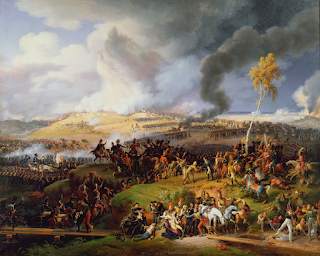 |
| Leo Tolstoy - a painting by Ilya Repin |
Not for me, at least. In my case, the tipping point came early in the pandemic when some people began online readathons to keep sane during the lockdowns. And what can be better for the purpose than books that people insist should be read in a lifetime? So I began the big book.
I began it on June 4, 2020. However, I seem to have suddenly picked up the pace in more recent months. Certainly it was after I came across an article which looked at reading for 30 minutes a day and covering some 30 pages in that rhythm. And thus it is that I finished the book sooner than anticipated.
It is an easy book to read and holds your attention most of the time. People love family gossip. War and Peace is as easy to get into as is the TV series, Friends. And, while friends are many in the book, the story mainly revolves around two families: the Rostovs and the Bolkonskys.
The Rostovs are father and mother and their three children. There is also a poor relative, a girl called Sonia. But our attention from the start is focused on fair young Natasha, the little daughter running hither and thither at a grand party for the grownups. Although we will plod through the wastes of war after all that partying, she will linger in our memory and slowly but surely emerge as the love interest for Prince Andrew Bolkonsky, one of the major figures in the story.
Though Natasha’s confidante is mostly poor Sonia, she is equally at ease with both her brothers. And the destinies of the two major families in the story are further cemented when the elder brother, Nicholas, falls in love with Andrew’s sister, Princess Mary.
While both families are wealthy and from noble lineages, the Rostovs reach ruin as the elder son incurs gambling debts but their father is no less responsible for rapidly running through the family’s finances.
And, lastly, there is the youngest son, Petya, with whom Natasha continues to enjoy childhood joys well into her womanhood.
Last but not least is the long suffering Sonia who is in love with the elder brother, Nicholas. Having no money of her own, she spells tragedy for the family if Nicholas marries her and so it is soon established that this is a lost cause.
In contrast, the Bolkonskys are an aloof lot. An eccentric father spends his days in study and torments his frail daughter out of contempt. He is rather more proud of his son who, in any case, respects his aged father.
We meet most of this star cast early and mostly in the grand settings of ballrooms and at dinner parties. Except for the elderly Prince Bolkonsky and his daughter who live in exile.
Then comes the war – Napoleon has marched into Russia. Prince Andrew goes to battle as does Nicholas. And, in time, Petya too.
The volumes of the book that deal mostly with the war do not mention much about the rest of the family but there is a break in hostilities and we return to the families. Andrew comes back from being a prisoner of war to find his wife on her death bed from childbirth. It is a dark tragedy for him, compounded by the guilt he experiences as he had pure contempt for his childlike wife.
However, when his mind is more settled by working for the welfare of the peasants who toil for him, and in the course of traveling for work, he stays a night with the Rostovs and there he becomes aware of Natasha.
The seeds of love are sown and bear flower when he meets her next but his ill tempered father does not view the match with favour and so Andrew chooses to stay away from Natasha for a year.
As fate will have it, when his return is imminent, a scoundrel seduces Natasha and is about to elope with her. The bid is foiled but rumour spreads and Andrew coldly sets Natasha free of their engagement.
War returns to tear the families apart and, this time, Andrew is fatally wounded.
As fate will have it, when his return is imminent, a scoundrel seduces Natasha and is about to elope with her. The bid is foiled but rumour spreads and Andrew coldly sets Natasha free of their engagement.
War returns to tear the families apart and, this time, Andrew is fatally wounded.
 |
| Battle of Moscow, 7th September 1812, 1822 by Louis-François Lejeune |
Natasha serendipitously nurses him to the end and, somehow, that love is vindicated.
Yet, somehow too, his death sets his sister free to marry Nicholas. Thus the story closes with the two families becoming very close.
Besides these two families there are, of course, several others but those are not shown to us in as great detail.
Taking these two families as background, Tolstoy paints for us a grand canvas of Russia in that time and exhorts us to remember how terrible war is.
Families lose dear ones in war. Even unarmed women and children get killed in battles. Wars destroy the finances of a nation, affect agriculture and lay low edifices that have taken years to build. The heart of a nation beats in its household hearths. War plunders not only the wealth of a country but decimates the peaceful pace of family life.